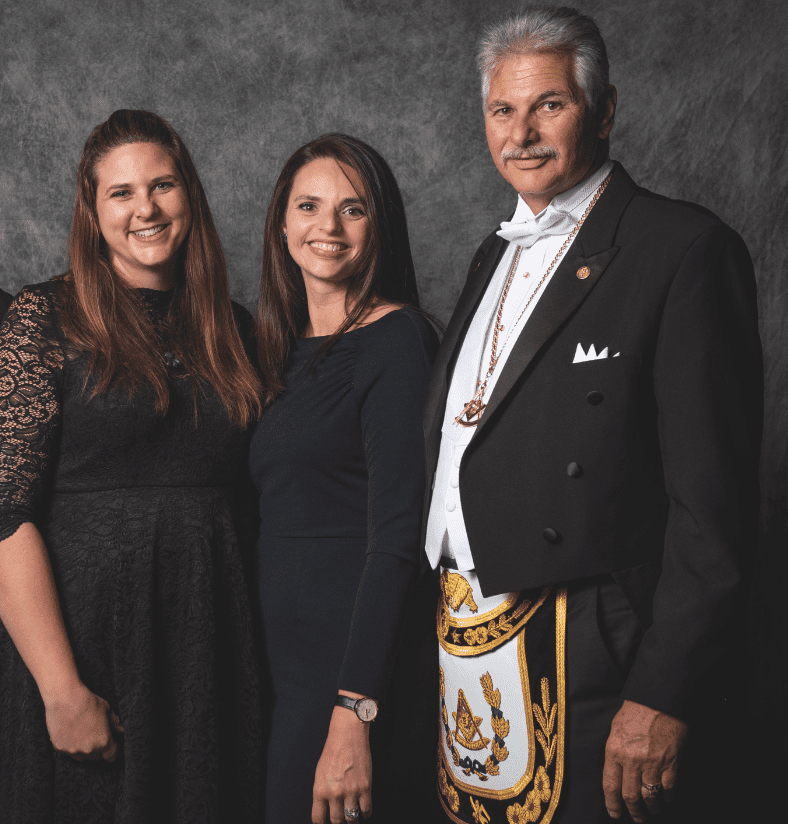
Leaving a Legacy
Grand Master Trauner explains that what Masonry gives us, we give our daughters.
By Laura Benys

It’s a tough gig parenting a teenager. It’s in their DNA to pull away from you, to define themselves as individuals. For as hot as their emotions can run, they’re practically allergic to affection—or else, depending on the day or even the hour, they’re desperate for it. It’s a familiar and exhausting back-and-forth.
As hard as parenting a teenager is, being one is even harder. That goes double for teenage girls, who along with typical adolescent peer pressure, academic stress, and the whole army of hormones suddenly mounting inside them, are also under incredible pressure to look and behave according to impossible standards. By the time they reach puberty, teenage girls are twice as likely to be diagnosed with a mood disorder like anxiety or depression than boys are.
Consider: Nearly a quarter of teenage girls display symptoms of depression, and girls make up two-thirds of all teenagers taking antidepressants. Nine out of ten hospitalizations for eating disorders are of girls. And in some parts of the country, as many as 30 percent of teenage girls have reported self-harming behaviors like cutting and burning. Stats like those, taken all together, can make the father-daughter relationship—so warm and fuzzy in early childhood—feel impossible to navigate in adolescence. That’s when it’s time to call in the cavalry.
The team of counselors and therapists at the Masonic Center for Youth and Families have a first-row seat to the high-wire act that is the father-daughter experience. And, particularly in the age of COVID-19 and life under lockdown adding to the pressure cooker of home life, the center is in a unique position to help. It serves children and young adults aged 4 to 24 and their families with a range of emotional wellness services, all of which are available online, including via expanded videoconference sessions. For some, that includes confronting weighty issues like trauma, suicidal thinking, self-harm, and substance abuse. For others, it’s dealing with the relatively humdrum—but still dizzying—roller coaster of adolescence.
Masonic dads, explains MCYAF executive director Kimberly Rich, are in many ways already familiar with the most important concepts when it comes to parenting teenagers: providing unconditional support, building and maintaining trust, and offering a hand. One thing they’re not always so good at? Asking for help.
And yet that’s exactly what most parents need. Teenagers, Rich explains, are hard-wired for irrational and even reckless behavior. The brain’s frontal lobe doesn’t fully develop until age 25, so although they may look like adults, their critical-thinking skills like logic and reason haven’t kicked in yet. They need support in making good decisions, along with reasonable limits to keep them safe, whether that pertains to seeing friends in a time of social distancing, taking the car out, or just having more screen time. Sessions with an MCYAF counselor offer a way for families to open new lines of communication with their teens and provide practical strategies for parents to hold the line while maintaining a strong, loving relationship “We parents have to walk this line of respecting privacy—because that’s how we develop trust—and keeping our kids safe,” Rich says.
One favorite tip is to resort to a kind of reverse spycraft: “Let your kids catch you being proud of them,” she advises. If they’re within earshot while you’re on the phone—and yes, they hear everything—brag about something great they did recently. Your teenager will never admit it, but it’ll mean the world to them.
“Their job as a teen is to push you away,” Rich says. “Your job is to find ways to stay connected.” That can mean reading the books they’re reading or learning about the show they’re obsessed with. Let them teach you their favorite TikTok dance—and then let them make fun of you when you mess it up. (Rich says she’s familiar with that one.) And although teens are notorious for shrugging it off, “Every day, tell your kids you love them,” she says. Rich has another favorite piece of advice that should resonate with all Masons: Be a good example.
“Dads play a critical role in the psychological development of their daughters,” Rich says. “You become the template by which they measure other male relationships. So it’s critical that you model the way men are supposed to view and treat women.” What she hears from you resonates with your daughters in a very important way. You have a deep responsibility to make a lasting impact on your daughter’s overall emotional development. Just remember, Rich says: “Your daughters are watching you. And they look up to you.”

Grand Master Trauner explains that what Masonry gives us, we give our daughters.

A compendium of tips and advice for working with the youth orders.

A resort-town Masonic lodge goes digital—and the prospects follow.